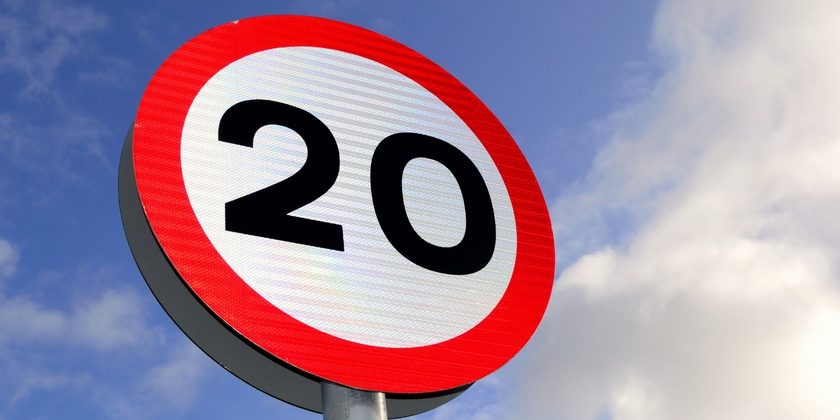“20mph limit will help reduce the number of collisions and severity of injuries,” says paediatric trauma leader

Welsh Government have allocated around £800,000 to spend on telling you all about the new 20MPH zones – Wrexham.com appears to be noted in their communications plan as ‘earned’ coverage such as this article, rather than paid promotion for the likes of legacy media or big social media giants. Our questions to Welsh Government on the 21st & 27th July remain unanswered.
“It’s simple, slower speeds save lives! Every year in Wales we see the devastating impacts road traffic collisions have on children and their families. They are the biggest single cause of serious injury in children who are typically walking or cycling.”
Those were the views from University Hospital of Wales’ Paediatric Emergency Consultant, Dr David Hanna circulated by Welsh Government ahead of the introduction of a 20mph default speed limit on restricted roads across Wales from Sunday 17 September.
According to data provided by the Welsh government, 20 people are killed or seriously injured on Welsh roads every week, they say according to the latest police recorded collision data.
International evidence also shows that on average, a person is around five times more likely to be killed when hit by a vehicle travelling at 30mph compared to 20mph.
According to Dr Hanna children are at more risk than adults.
He added: “Children have less road awareness than adults and can be difficult to see.
“They also tend to be struck higher on the body than adults due to their smaller height, and more likely to suffer severe injuries as a result.
“So, the 20mph limit will help reduce the number of collisions and severity of injuries.”
Speaking at the visit to the Emergency Unit at the UHW, Chief Medical Officer for Wales, Frank Atherton said: “We’re now just over a month away from the biggest change in community safety we have seen in Wales for a generation. Reducing speeds not only saves lives, but helps us to build stronger, safer communities.
“Evidence from across the world shows that vehicle speed is one of the main reasons why people do not walk or cycle, with one in three Welsh adults saying that 20mph would increase their likelihood to walk or cycle more.
“So, not only will slower speeds save lives and reduce injuries, it will also help to keep people healthier and reduce the burden on the NHS.
Dr Sarah Jones, Consultant in Environment Public Health, Public Health Wales added: “Making the change from 30mph to 20mph could result in 40% fewer collisions every year, with 6 to 10 lives saved and between 1200 to 2000 people avoiding injury.
“In casualty prevention this would save an estimated £92m in the first year alone.”
As we have previously written on data and the evidence base…
However Welsh Government have published a documented dated 2018 on their 20 MPH pages (the only one showing for ‘evidence’), “The state of the evidence on 20mph speed limits with regards to road safety, active travel and air pollution impacts“.
It refers to a 2017 study, ‘Twenty miles per hour speed limits: a sustainable solution to public health problems in Wales, Journal of Epidemiology and Community Health, 71: pp.699–706’.
The summary notes:
The authors estimated that as a result of introducing 20mph speed limits:
in terms of road traffic injuries, 6–10 lives would be saved and 1200–2000
casualties avoided each year, at a value of prevention of £58M–£94M.
12
in terms of air pollution, deaths attributed to nitrogen dioxide (NO2) may
increase by 63, and years of life lost by 753. However, deaths attributed to
particulates (PM2.5) may decrease by 117 and years of life lost by 1400, and
thus overall gains of 54 lives saved and a decrease of 647 years of life lost.
Later that is summarised as “Estimations of the likely level of lives and casualties avoided have been estimated by
Jones and Brunt (2017) for Wales. This study reported that if all 30mph roads in
Wales were replaced by 20mph speed limits 6–10 lives would be saved and 1200–
2000 casualties avoided each year, at a prevention value of £58M–£94M each year”
That 2017 study itself is not public, but you can buy a copy via the British Medical Journals for £38.
Wrexham.com purchased a copy of the 8 page PDF.
The methodology shows police crash data (STATS19) for 2011–2013 were used to identify all crash casualties injured on roads in Wales with a 30 mph limit. The number of fatal, serious and slight casualties was calculated for each year and the effect of 20 mph limits estimated by reducing the actual numbers by 42% ,25% and 4% – “the effect needed to save just one life”.
The figures may not show the full picture of incidents as it states STATS19 figures are ‘known to undercount pedestrian and cyclist casualties’. The research also notes it has “not accounted for potential increases in cycling/pedestrian casualties that may occur because there are more of them” – something relevant in Wales with a push towards more active travel.
The value of prevention was calculated using UK Department for Transport (DfT) figures for 2012 – for example an ‘estimated value of prevention, per casualty’ is given as £1.9m, in the latest DfT figures for 2021 is now £2.1m.
The report concludes, “The evidence presented here suggests a national 20 mph limit would substantially reduce road traffic casualties and, at worst, would not lead to a direct change in air pollution. Indirectly, if people are encouraged to switch to active travel, there are likely to be greater reductions in air pollution. The health and cost savings of the approach are likely to be substantial and although the costs of implementation are not accounted for here, they are likely to be far lower than the benefits.”
Spotted something? Got a story? Email [email protected]












